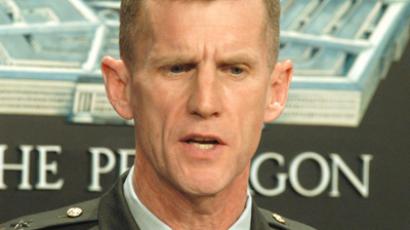Michael Hastings: Pentagon Press Corps is an extension of Pentagon
A year after a scathing article in Rolling Stone forced US Army general Stanley McChrystal out of his post in Afghanistan, journalist Michael Hastings reflects on the experience that ended up not at all like he would have imagined.
“I was somewhat surprised by the response,” Hastings told RT. His article, The Runaway General, made headlines after it outted McChrystal and other top-brass in the military for showing a lack of faith in the operation and the Obama administration’s command in Afghanistan. By the time the fallout subsided, McChrystal was removed and Hastings was a hero for his no-holds barred account of the war machine’s bureaucracy.“I thought he was untouchable,” said Hastings. Hastings learned a lot from his reporting, but aside from the realities of what words can do to a respected military general, the journalists said that perhaps most eye opening was how in cahoots the Department of Defense is with their own gang of reporters who are supposed to be documenting the United States’ involvement overseas. “It’s called the Pentagon Press Corps, right?” asked Hastings. “So one would assume they have a watchdog function as to look after the Pentagon. But what it’s become is that the Pentagon Press Corp is just an extension of the Pentagon itself.”“You don’t have critical coverage,” added Hastings.The reporter says that what Americans get by way of the Pentagon-approved band of journalists isn’t “necessary stenography,” because, as Hastings put it, “sometimes they do break stories.” Sadly, however, “it’s not the kind of stories that I . . . think are very helpful,” he said.Hastings acknowledged that he took a lot of flak for his reporting, but is still recognized by a group of writers who are still true to the journalistic code. “There is an opportunity for this golden age to resist against this, but it’s an uphill battle,” he said. “The reason why the response was so severe in my case or in the case of like WikiLeaks with Bradley Manning and Julian Assange, is they want to set an example,” said Hastings. “They want to show, ‘oh no, you can’t do this. You can’t actually report what powerful people say.’”“You can’t try to write as accurately and truthful as possible about these people, because if you do you will be exiled.”Hastings may have nor been prepared for the ride that his reporting took him on, but he said it could be much worse.“I’m still alive. I’m still standing. They haven’t put a drone strike out on me. I’m not at Guantanamo.”Even if he is the exception as PFC Bradley Manning awaits a possible life sentence for his role with WikiLeaks, Hastings said that it doesn’t always have to be that way. “You can be very critical and fair to those in power and still have a career as a journalist,” he told RT.















